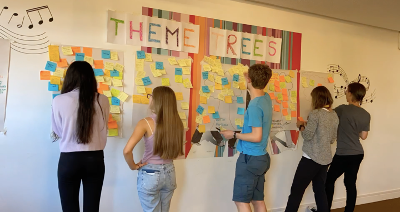Resi Reflections on the #iwill Data Collection Process
2022-09-13
After a busy few weeks of data collection, our Young Evaluators Panel came together in August to analyse and dissect their findings from the social inquiry, as part of our evaluation into the impact of youth voice within the #iwill Fund.
The data collection took place across July and August 2022, where the Young Evaluators ran both online and in-person interviews and focus groups with #iwill Match Funders, delivery partners, young people engaged in youth voice - including The National Lottery Community Fund Youth Voice Team and DCMS Youth Policy Advisory Group - government policy advisors, and The National Lottery Community Fund (TNLFC) staff. The purpose of the social inquiry was to build on the data collected through the data trawl that took place earlier this year. Specifically, the social inquiry aimed to explore how young people practically and emotionally experience youth voice activities, what organisations need in order to deliver youth voice activities well, and the ways in which change is experienced as a result of youth voice.
The majority of interviews were conducted by the Young Evaluators in groups of two or three, with each Young Evaluator taking part in at least one interview. They’ve noticed that through the data collection process, their confidence and interviewing skills to have grown as they have become more assured in steering conversations. It was even decided that our presence in the ‘Zoom room’ was cramping their style a bit by the end(!).It has been fantastic to see the Young Evaluators really taking ownership of the data collection process, from quickly adapting questions for younger participants, to asking insightful follow-up questions, as Jo and I took a backseat.
Mulling over the data analysis process
By the end of day two of our residential, our brains had turned to mush, the sugary supplies had run out, and we had no energy for podcasting. So, we did as all good researchers do – pulled up a chair, hit record on the dictaphone, and sat down to mull over the days’ events.
In our early discussions, we conceptualised sub-themes and codes for our data as branches of a tree. This was a useful approach when we came to visually presenting our emerging themes. The Panel found that the process of organising the data across ‘theme trees’ and developing, (re)arranging, and consolidating the branches of these trees allowed them to finetune their qualitative data skills and consider their findings in an easily digestible method.
"I really liked this way of doing it. I think it's really easy to conceptualise, and you can discuss it all and... move it all around.” (Amy)
Throughout the two days, we also all came to find value in analysing pieces of data in mini ‘sprint cycles’ that comprised a process of coding, reviewing, and discussing. Ensuring there were touch points built in for discussion and deliberation enabled a balance to be struck between taking on board our individual conceptualisation of codes and themes, and working together to join them into hybrid categories – a great lesson in collaborative coding!
Having ‘hard data’ also seemed to really help sharpen the ideas of the young evaluators. Reflecting on how far they had come since the last residential, Harman noted "Compared to April, where we had so many ideas and we were creating so many different categories, this time we were really specific in terms of our ideas and how we wanted to label them. So, the process [of categorising them] was a lot easier!" The process of bringing these categories together to explain the data – navigating challenges such as deciding which ‘tree’ they really stem from (is it just a matter of perspective?), or where ‘branches’ might be one and the same – is never an easy task, even when there is just one mind working on it. Inviting five young people into a room with limited experience of analysing data and asking them to do that together adds a whole other dimension of complexity. It is testament to our Young Evaluators’ respect for each other and the evaluation, and their brilliant minds and good energy, that they did this so well.

Emerging themes – watch this space!
In coming together to discuss and review our initial coding, we were able to lose the specificity of individual contexts, and focus on the narratives that emerged, which supported meaning making of the data as a whole.
There were lots of interesting touch points that arose through the interviews and focus groups. Themes emerged around young people’s experiences of youth voice, highlighting the power dynamics of engaging young people in adult-led spaces in a way that is both inclusive and accessible. Delivery partners discussed best practices and processes to embed youth voice, using their influence in the sector to affect change, and the need for more youth voice training and development opportunities.
Our next steps are to collate our findings and share our data with an Advisory Panel to assess our key themes and offer guidance on the practice toolkits that will be produced as part of this evaluation. We will then reconvene in October at our next residential to prepare for our Outcomes Summit at the of November. The Outcomes Summit will be a public event, where we’ll be sharing the findings generated through the data collection and analysis process, so please do keep your eyes peeled for information about how you can join us.
